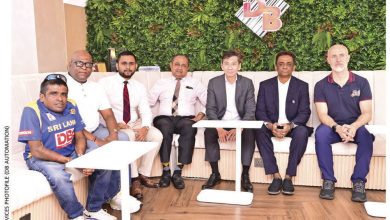HEINEKEN LANKA LIMITED
 Q: What is your assessment of Sri Lanka’s economic recovery from a financial perspective?
Q: What is your assessment of Sri Lanka’s economic recovery from a financial perspective?
A: Optimistic and hopeful! It will be a slow recovery and I expect the economy to return to 2019 levels by the second half of next year. We should see export led growth, and a shift towards a production led economy in the agriculture and service sectors.
The government’s investor friendly policies, and prioritising value added industries such as pharmaceuticals and IT for investments, should provide the much needed value added boost for both exports and domestic production.
Moreover, the resumption of tourism will play a vital role in an economic recovery – facilitating both a steady foreign exchange inflow (not subject to speculation) and boost to the economy especially the hard hit tourism industry.
The vaccination programme’s success can be strengthened by making testing more accessible to the public. This will build confidence among people to return to normalcy when the restrictions are relaxed.
Q: Given the COVID-19 pandemic, how do you think businesses need to pivot to stay relevant?
A: The pandemic has given rise to changes in consumption and businesses need to stay abreast of these rapidly evolving consumer trends in the ‘new normal.’
We have seen an upsurge in consumers’ online buying habits with an increase in home deliveries and more bulk purchases among fixed income consumers. Disposable incomes were impacted among those in small businesses and daily wage earners, impacting the frequency of purchases as necessities were prioritised.
Accelerating digital strategies is a must to connect with customers, consumers, employees and other key stakeholders including government authorities, leading to the adoption of new business models. We need to ensure the use of data and analytics to provide timely information to the business.
Proactively managing headwinds – both from global supply constraints and country policies – is necessary. Against this backdrop, cost management and the diversification of risks become more important than ever.
Companies need to be able to fuel growth when the economy recovers in the new normal, and possess the capacity and resources to respond when demand picks up.
At Heineken, we have segregated the responsibility for managing the healthcare crisis, ensuring business continuity and managing growth. This has helped us to be focussed and ensure we’re able to manage the tough times in a balanced manner.
Finally, cash is king. Businesses must ensure that their cash flow levels are adequate with headroom in case of any such unforeseen closures in the future.
Q: What are the main barriers to the growth of the alcoholic beverage (‘alcobev’) sector in Sri Lanka?
A: Restricted commercial freedom to operate is the most significant barrier to alcobev operators growing in line with global trends.
The world is moving towards low and no alcohol content beers; but the licence to brew in Sri Lanka has a floor of four percent and as such, does not allow us to introduce lower alcohol content products. This would benefit consumers’ health while generating additional government revenue.
Another barrier is the restrictions on home delivery, which must be lifted to combat the COVID-19 healthcare crisis.
Additionally, the lack of a stable policy for the alcobev sector in addition to taxation and other restrictions such as import barriers makes investment decisions complicated.
It is important to emphasise that Sri Lanka’s excise taxation policy does not reflect globally and WHO accepted norms where mild alcohol is taxed less than stronger alcohol-based products.
Until November 2017, mild beer (i.e. less than 5% alcohol content) was taxed 20 percent higher than spirits. This was corrected to a greater extent in 2017 but the gap once again increased in 2018/19 by only increasing taxes on beer and maintaining that for spirits.
This swayed consumer preference towards spirits from softer alcohol like beer due to value for money.
Q: Are international trends applicable in the Sri Lankan context?
A: The world is moving towards low and no alcohol beverages, and more ‘sessionable’ products that are milder and smoother in taste. Selected Sri Lankan consumers are seeking variety.
However, the Sri Lankan beer market is still very basic and operates in basic taste categories.
Q: Given that Heineken is an international brand, how would you describe the competition?
A: The beer sector is a two player market here, and the spirits segment comprises three large players and more than 20 others. We’re positioned as the only multinational operating in the alcobev market in Sri Lanka and are also governed by a strict code of conduct.
The limited licences available have given customers a great deal of bargaining power. With all players competing in a limited universe of approximately 3,000 outlets, the cost of operations is increasing year on year. The recent decision to liberalise and provide licences to supermarkets is a welcome move.
A close examination of the value chains indicates that approximately 60 percent of the sector’s value consists of direct and indirect taxes (excise and sales taxes). The leakages in taxation means not only forgone government revenue (estimated at Rs. 40 billion a year) but also that the same monies can be used for heavy discounting.
As a result of this and the sector’s high fixed cost nature, the larger players have also been forced to offer higher margins to retailers – and therefore, there has been a spiralling effect on the retail share of margins over the years.
Q: Could you outline the major challenges faced by the sector in the last six months?
A: The main challenge has been the weak demand during the lockdowns imposed in 2020/21 with about 60 non-selling days each year during which zero revenue was generated for companies and the government.
The recent attempt to introduce tax stamps in a two player sector with no revenue leakage will only lead to more forex outflows and complicate operations in a heavily regulated arena. Curbing the duty not paid on spirits operations using technology – where the biggest revenue leakage occurs – is the solution to revenue leakage.
Rising commodity prices, and the direct and indirect impacts of forex devaluations, are the biggest headwinds as it is not feasible to pass all cost increases onto the consumer.
Market conditions are challenging at best for the alcobev sector.
Q: What are the organisation’s plans going forward?
A: We are committed to our Sri Lankan operations and have invested in this brewery over the last five years, bringing in an investment of US$ 7 million in 2019 to upgrade the brewing facilities and provide world-class beers to consumers.
Operating in the milder beer segments (low alcohol content beers) and introducing more sessionable beers remain high on our agenda to drive responsible consumption.
We remain committed to sustainable operations in the areas of energy and the environment.
Furthermore, the health and safety of our people is key, and we’re focussed on building and exporting talent across the company’s global network.
Inclusion and diversity is vital for us. Heineken Lanka aims to be a positive influence in the market by adopting global governance standards that enable us to function in an optimal manner.
Compiled by Yamini Sequeira
INTERVIEWEE DETAILS
Samanthi Kariyawasam
Finance Director
COMPANY DETAILS
Telephone4866575
Websites:www.heinekenlanka.com





